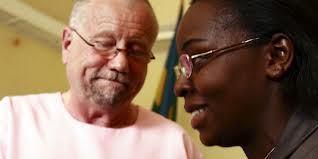
Peter Erlinder, US International Lawyer who in May 2010 went to Rwanda to defend Victoire Ingabire [in the picture], the now imprisoned politician, chairperson of the political party of opposition FDU-Inkingi. The lawyer got instead imprisoned by the Rwandan President Paul Kagame for allegations that he was a genocidaire and genocide denial. He was released only further to pressure from the international community and Hilary Clinton’s intervention.
After months of hesitations in London and Washington, they decided to end the privileged relationship the two capitals have developed with Kigali particularly after the genocide of 1994, or even before that as some sources think.
Some explain such development by the apparent abuse by the Rwandan leader of the sense of guilt over the inefficiency of the overall international community during such tragedy.
The verdict came.
And it was not pleasant for the Rwandan president.
After so many cases of interference in the Democratic Republic of Congo, either individually or with the cooperation of Uganda and Burundi, during all those years, more than 6 millions of Congolese and Rwandan refugees have died as a consequence.
But the danger of a single story was one day going to knock on their door, at the time when they thought no other side of that same story could be acceptable, so much so they had become complacent in its very one version.
On October 1st, 1990, when the Rwandan Patriotic Front of President Paul Kagame invaded Rwanda from Uganda and fully backed by Joweri Museveni, the Rwandan government of former President Juvenal Habyarimana complained to the international community about his country being attacked by its northern neighbor.
The same scenario has been happening with Uganda, Rwanda and less with Burundi several times in the last two decades when these countries entered militarily the Democratic Republic of Congo under different motives.
In fact, back in 1990, the RPF contingent which attacked Rwanda was part of the Ugandan military forces up to the day it entered the Rwandan territory.
Consequently, in practical terms Rwanda was victim of a Ugandan invasion.
But nobody listened to Juvenal Habyarimana’s recriminations. What followed until today is part of the tragic recent history of the region.
But the tragedy had started much earlier with the arrival in power of the Ugandan President Joweri Museveni in 1986.
The narrative by his American and British and other sponsors that will promote a single story of bad guys against good guys has prevailed so far.
It is only since June 2012 with the publication of the UN Group of Experts report on the Democratic Republic of Congo and its subsequent updates as M23 creates chaos in the North Kivu province of the DRC that a complete shift from the past 25 years seems to unfold.
The beneficiaries [Rwanda and Uganda] of yesterday’s single story seem not to understand that such seismic change in their understanding of the context they have flourished in for so long could happen.
As they took advantage of everything the single story could provide them with, they are today complaining that they are too victims of one-sided interpretation of their world, not knowing that what had favoured them in the past was only the fact that their sponsors had been looking all the time the other way while they abused their trust.
As the tide changes direction and heads towards different shores, for many survivors and many millions who unfortunately have gone too early without that being their fault, it is better late than never. For those who will get to destination, it’s already a new dawn.
